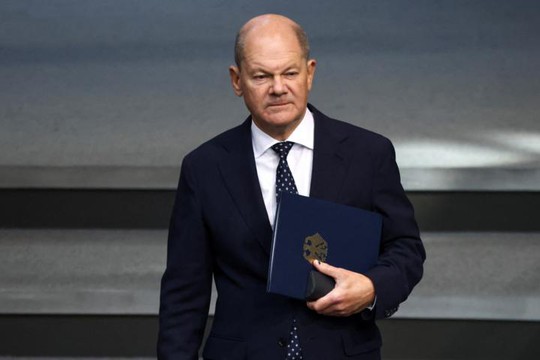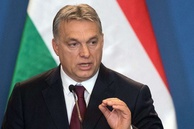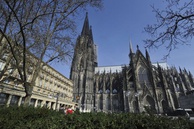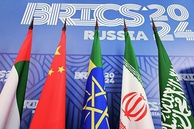A recent forecast by the International Monetary Fund (IMF) has yet again downgraded Germany's economic outlook. The country's economy is in turmoil, experiencing its second consecutive year of recession. IMF experts predict that Germany's GDP growth in 2024 will be nearly zero compared to the previous year. The situation is further aggravated by the fact that, according to many forecasts, the upcoming 2025 year will not be any better.
At present, both domestic and international press, which once respectfully referred to Germany as “the European locomotive”, has dubbed it the "Sick Man of Europe"." This expression, aptly used by Russian Tsar Nicholas I to describe the sorry state of the Ottoman Empire, has become common in German commentators' discussions about the processes underway in German industry. Just look at the headlines in the media: the Volkswagen Group is planning to close three factories and move its main production abroad; German Mercedes-Benz cars are selling poorly in China, leading to a 54% drop in Mercedes-Benz profits; the tax base in the country has shrunk, leaving the 2025 federal budget short of funds; German metallurgists have announced a nationwide strike; the state-owned railway company Deutsche Bahn is selling its subsidiary logistics company to cover debts; the chemical concern BASF is complaining about a lack of energy resources, and so on. From all these news stories, it's easy to construct a long chain of negative facts leading to a clear conclusion: the federal government led by Chancellor Olaf Scholz is losing control over the economic situation and is unable to find effective ways out of the crisis.
The entire "traffic light" troika – the chancellor himself (SPD), Vice Chancellor and Minister of Economics Robert Habeck (Greens), and Minister of Finance Christian Lindner (FDP) – is bogged down in mutual disputes and is desperately seeking solutions through various factory visits and consultations with businesses. However, no light at the end of the tunnel has been sighted yet. Tensions between the parties over economic failures have escalated so much that there is even talk of an imminent collapse of the ruling coalition. In this context, political observers and the press were stirred by a strange collision: on one and the same day, October 29th, two high-level economic meetings were convened in Berlin. One was hosted by Chancellor Scholz himself, inviting the captains of German industry and union leaders from key sectors – car-making, metal-working, and chemical industries. However, neither Minister of Economics Robert Habeck nor Minister of Finance Lindner were invited to this "industry summit." Lindner called another meeting under the auspices of the parliamentary group of Free Democrats in the Bundestag – they say, as an alternative to the chancellor's summit. He also invited heads of large companies, but mainly numerous representatives of small and medium-sized businesses, often called the backbone of the German economy. The press has already dubbed it the "summit of medium-sized businesses." Notably, Minister Habeck was absent there as well. Lindner's meeting marked a direct contrast with Scholz's summit: politicians, as it were, should talk to all levels of the economy, not just with industry like the chancellor.
This story has already been dubbed the "dispute at the highest level." "Within the SPD," notes the mouthpiece of business circles Handelsblatt, "the FDP summit was perceived as expected: as a provocation. Some high-ranking representatives of the 'traffic light' coalition even believe that Scholz will indeed have to fire Lindner after this maneuver. According to a coalition representative, Lindner's counter-summit not only intensifies the ongoing dispute in the 'traffic light' coalition, but also personally discredits the chancellor." The newspaper indicates that there is suspicion in the SPD and the Green Party that "Lindner is intentionally working to provoke his own expulsion." Commentators believe that never before has there been such a high probability as there is now that the government could collapse prematurely. It is noted that all parties are working through this scenario, including the option of a red-green minority government – without the Free Democrats.
At Scholz's meeting, the bad economic news was primarily related to the dramatic situation in the automobile industry. The focus was on the Volkswagen Group, which announced the transfer of its main production abroad and the imminent closure of its first factories in Germany, first of all, they will most likely shut down in Osnabrück and Dresden. But the factories in Emden and Zwickau are also under threat. This means cutting thousands of jobs, but the exact number has yet to be disclosed by the company's management. There is a strict VW cost-cutting program to achieve a reduction in expenses of €4 billion. Half of this is to be guaranteed through lower compensation for workers employed by the main German brand, as well as through the cancellation of various bonus payments and allowances for the remaining employees. Given VW's focus on electric car production, Scholz proposed reducing the fees for using power grids. He also expressed willingness to expand the range of energy-intensive industries that receive government aid due to high electricity costs. The chancellor sees the meeting as a prelude to a series of negotiations – another meeting with the same circle of people is scheduled for November 15th. Scholz called for the joint development of an "industry pact" with specific measures. Incidentally, the Volkswagen problem is not only about the companies themselves, but also about the future of the entire city of Wolfsburg (Lower Saxony), with a population of 126,000, the central base of the concern. One of the youngest cities in Germany, in fact, a city-factory where everything – from factory shops and test tracks to pharmacies, schools, and hospitals – bears the VW logo, could now become a major headache for the authorities.
However, it should be noted that neither of the "traffic light" leaders' meetings has yet provided any real insights into how they plan to actually pull the German economy out of the crisis. Scholz's idea of a "pact" currently resembles an election campaign declaration, a shiny wrapper with no candy inside. The conservative opposition immediately picked up on this. Bavarian Prime Minister Markus Söder, the leader of the CSU, did not miss the opportunity to "kick" Scholz and Lindner for their competing summits: "Without a plan for the economy, without a plan for Germany, the 'traffic light' will not only disgrace itself with these competing summits but also our entire country."
"The problems with VW are indeed a worrying alarm bell, perhaps the one that many have been waiting for," Moritz Schularick, President of the Kiel Institute for the World Economy (IfW), wrote on social media platform X. The dramatic situation in the automobile industry is also illustrated by a study commissioned by the German Automotive Association VDA. According to its forecast, the transition to electric mobility could cost the industry an additional 140,000 jobs over the next ten years, following the loss of around 46,000 jobs since 2019. And today, German carmakers have to contend with a new headache – Donald Trump. The Republican stated that if he returns to the presidency of the United States, he will strive to make the main car brands from Germany primarily American and to have their main production in the United States. At a campaign rally in Georgia, Trump also threatened "very high tariffs" on cars produced outside the United States. This could affect German cars manufactured in Mexico, which has become a major production hub for Volkswagen, Audi, and BMW. Their factories are geared towards the US market. Trump has often threatened carmakers that move production to Mexico, where costs are lower, with a 200% tariff.
Meanwhile, economists are increasingly signaling the alarm, noting that the negative news about the automotive industry, as well as other German industrial giants, including BASF, Siemens, and ThyssenKrupp, are undoubtedly symptoms of the deepening crisis in German industry. Experts expect the share of the industrial sector in Germany's GDP to continue to decline in the next decade. This concern was further confirmed by new data released by Minister Habeck.
Presenting the traditional autumn government forecast, he announced an expected GDP contraction of 0.2%, revising the optimistic spring forecast of growth by 0.3%.
Not accidentally, at Scholz's meeting, the issue of energy security for industry was among the priority problems. Experts talk about the "constant loss of production capacity in energy-intensive industries" following the 2022 energy crisis, triggered by the severance of energy cooperation with Russia over the Ukrainian conflict. The excessive hope on "green" energy technologies and decarbonization, experts note, not only failed to yield the desired results, but also led to a decrease in the competitiveness of German enterprises. "The price shock for energy carriers as a result of the war in Ukraine hit the economy harder than was thought for a long time," acknowledges Handelsblatt. As a result, more and more companies are either leaving the country altogether or, at least, investing more in their foreign factories than in Germany. The chemical giant BASF, for example, is building a €10 billion plant in China.
Most experts maintain that the best way to overcome the crisis and to increase the competitiveness of the German economy is to carry out long-overdue structural reforms. The Merkel model of long bygone successful economy is too obviously lagging behind the demands of the time. The focus should be on new technological sectors and new investments in them: microelectronics and artificial intelligence (AI), biotechnology, green technologies, and others. For example, researchers from the consulting firm McKinsey Global Institute found that the twelve fastest-growing sectors, such as software, semiconductors, e-commerce, or cloud services, currently account for about half of global economic income, whereas in 2005, this figure was only ten percent. And the export-oriented model of German industry should be supported by tapping new markets.
The government of Olaf Scholz cannot be accused of not understanding this. However, he has had fewer successes than unfortunate failures on this path. For example, in February 2023, the government presented the public with a joint project worth €2.75 billion with the American company Wolfspeed to build a new microchip factory in Ensdorf, in the western state of Saarland. But recently, Wolfspeed abandoned the project. The Scholz government also encountered a setback in another important project: with the US company Intel. This project involved the construction of a €30 billion microchip factory for the brand in Magdeburg. The federal government was preparing to contribute one-third of this amount. But the second project also failed. Intel lost about half of its market value this year. As the press noted, the Scholz Cabinet "was blinded by two American corporations." Now, everything depends on the last resort – the Taiwanese leading microelectronics giant TSMC. It has already begun construction of its microchip factory in Dresden. The project cost is €10 billion. German companies Bosch and Dax Infineon, as well as Dutch NXP, are participating as partners. The German government allocated €5 billion to the project.
Steps are also being taken to develop the AI sector. It is already being implemented by about 20% of German companies. As the global race in artificial intelligence gains momentum, Germany is developing ambitions to keep up with China and the United States. The medium-term goal – to achieve "technological sovereignty," meaning independence from foreign technology giants, was formulated at the German Digital Summit in Frankfurt am Main. However, despite all the attempts by Scholz and his ministers to meet the demands of the time, it is increasingly clear that the German government lacks a well-thought-out long-term economic strategy that would give German businesses a more or less clear understanding of the possibilities for getting out of the crisis.
On the contrary, the prolonged stay in recession is increasingly undermining entrepreneurial initiative, forcing some to close their businesses while others are moving their operations abroad. As a result, tax revenues into the federal budget have significantly decreased due to the recession, leaving a hole of several billion euros in the 2025 draft, just as in the previous year.
The extent to which this is felt is evident even in the government's loud declarations about supporting Ukraine, such as "as long as it takes," and their practical implementation. First, Germany indicated that it had already supplied Kyiv with enough weapons and that such supplies would be significantly reduced next year. Then it was the turn of the rather generous benefits for Ukrainian refugees in Germany which do not particularly encourage them to find work and work. And now the federal Finance Ministry plans to significantly "dry up" these benefits. The Ukrainian burden is clearly becoming too heavy even for Germany. German Defense Minister Boris Pistorius is increasingly concerned that the briskly started rearmament of the Bundeswehr could be slowed down. What can you do, recession...
read more in our Telegram-channel https://t.me/The_International_Affairs

 11:40 05.11.2024 •
11:40 05.11.2024 •



























